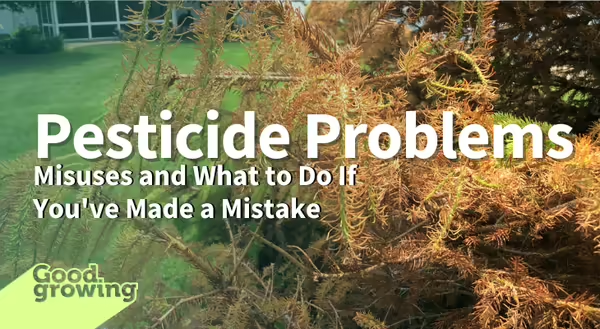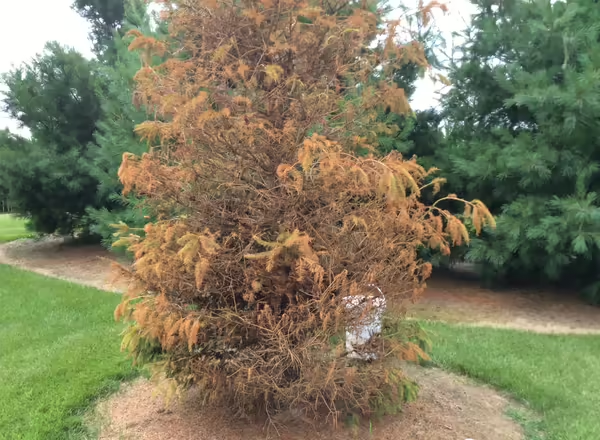
You sprayed what? Where?
There are a few occasions when it is a good thing people can’t read my facial expressions over the phone. One of those situations is when I get a phone call where someone has used a pesticide that is way off-label. By off-label, I am referring to spraying a pesticide in a manner that is not listed in the directions or is even forbidden by the directions.
Because these instances keep reoccurring year after year, I am assuming I am only getting a tiny fraction of phone calls from a greater amount of people who may be franticly searching the internet for answers to pesticide misuse. So, with the hope I can reach more than the handful of folks who call or email me personally, the following are some common instances of spraying a pesticide where it should not be used and the recommendations for what to do next.
Spraying chemical insect barriers on the vegetable garden
This might be the most common “You sprayed what?!” call I get each year. This situation often involves a thrifty spouse (typically a male) who buys an insecticide barrier to spray around the perimeter of a home. With a little extra pesticide remaining in the jug, their logic dictates that if this chemical kills bugs coming into the house, it will kill bugs eating the vegetables. They then spray their vegetable garden with the home defense spray.
Spraying a chemical insecticide barrier on your vegetables is off-label and often listed with a stern “Do not do that!” on the label. One reason is that chemical barrier insecticides are designed to persist in the environment. A majority of insecticides labeled for food crops are designed to degrade within a certain period. All labeled pesticides meant to be sprayed on vegetables will list the time needed to wait from spraying until food can be harvested, usually referred to as the pre-harvest interval.
What happens to a vegetable garden that has been sprayed with a chemical barrier insecticide? Well, I called up a few companies that make these products to get their take, and they all said no produce can be harvested from the garden for at least one growing season, and the garden must remain fallow for one year. I know squash bugs are a pain, but we still want to be able to eat some zucchini.
Mosquito foggers as repellants
This one is not as common, but I have seen it first-hand multiple times. The idea here is if a mosquito fogger works to keep mosquitoes away from an area, why not spray it on your skin to keep mosquitoes away from you? Again, this is using an insecticide in a wildly inappropriate fashion. But more to the point, most mosquito fogger active ingredients are killing the mosquitoes, not repelling them. And you don’t want to be spraying a chemical like that on your skin. Even the ‘natural’ oil-based foggers state to avoid skin contact.
Please don’t spray yourself with mosquito foggers. Reach for repellents containing active ingredients like DEET or oil of lemon eucalyptus. Repellents function by interfering with mosquito receptors that they would otherwise use to pick up on your carbon dioxide or lactic acid scents.
Learn more about keeping mosquitoes (and ticks) away. Mosquito and Tick Season is Upon Us
Spraying Tordon on lawns
It seems more people are falling in love with a brand called Tordon, which has become very popular for killing weeds. And rightly so, as it is very effective at killing broadleaved plants. It is becoming more common to see recommendations for using Tordon RTU, whose active ingredients are picloram and 2,4-D, on lawns. Yes, this product will kill dandelions and clover. However, I have seen it routinely kill landscape trees and shrubs. This is because one of the active ingredients, picloram, is highly soluble in water and readily moves in the soil, affecting non-target plants.
Be aware that the manufacturer of Tordon RTU clearly states on the label in bold lettering, “Tordon RTU should not be applied on residential or commercial lawns or near ornamental trees and shrubs.” Despite the clear labeling, some retailers still market this as a lawn herbicide.
Unfortunately, I have witnessed several homeowners lose valuable shade trees, hedges, and even an entire windbreak of evergreens in their effort to kill some dandelions. Tordon can remain toxic to plants for a year or more in the soil and can easily move into surface or groundwater.
My redbud looks strange
Here is another very common problem that is often traced back to the use of lawn herbicides. These are herbicides that are labeled for use on lawns (Unlike the aforementioned Tordon RTU), and commonly contain the active ingredients dicamba, 2,4-D, or MCPP (mecoprop). These active ingredients target broadleaf plants but will leave grass unharmed. Redbuds are highly sensitive to these chemicals considering they are after all a broadleaf plant. Even when neighboring lawns are treated, redbuds can show signs of leaf distortion.
Fortunately, redbuds often grow out of the damage even after reoccurring events. However, a severely damaged redbud can also serve as an early warning when it comes to more widespread herbicide damage on other desirable plants that may not show up right away.
Be mindful that while our lawn herbicides keep down the broad leaves, they run the risk of damaging desirable shrubs, trees, perennials, and vegetable crops.
The label is the law
While I hope this article has helped someone deal with the consequences of pesticide misuse, I hope even more that it has prevented damage to your gardens and landscapes in the first place. If there is any doubt, let me state the moral of this entire article is to read and follow pesticide labels.
While accidental misuse is one thing, knowingly misusing a pesticide is very serious. The labels on pesticide bottles are approved by the EPA and are considered a legal document. The label is the law.
Chemical drift from neighboring properties
Are you seeing possible herbicide damage in your yard, but you haven't sprayed anything? It takes a discerning eye to diagnose chemical drift as the symptoms can resemble many plant diseases, insect damage, or environmental stresses. Check out How to Handle Pesticide Drift Complaints A Guide for Those Affected by Drift to learn more about what to do next.
Good Growing Tip of the Week: Examples of pesticide misuse are numerous, but these products remain important tools. When considering pesticides, learn about your particular pest, use pesticides as a last resort, and always follow label directions.
Thank you for reading!
Sign up for our emails! Want to get notified when new Good Growing posts are available? SIGN ME UP
Give us feedback! How helpful was this information (click one): Very helpful | Somewhat helpful | Not very helpful
MEET THE AUTHOR
Chris Enroth is a horticulture educator with University of Illinois Extension, serving Henderson, McDonough, Knox, and Warren counties since 2012. Chris provides horticulture programming with an emphasis on the home gardener, landscape maintenance personnel, and commercial landscapers. Additional responsibilities include coordinating local county Master Gardener and Master Naturalist volunteers - providing their training, continuing education, advanced training, seasonal events, and organizing community outreach programs for horticulture and conservation assistance/education. In his spare time, Chris enjoys the outdoors, lounging in the garden among the flowers (weeds to most).
